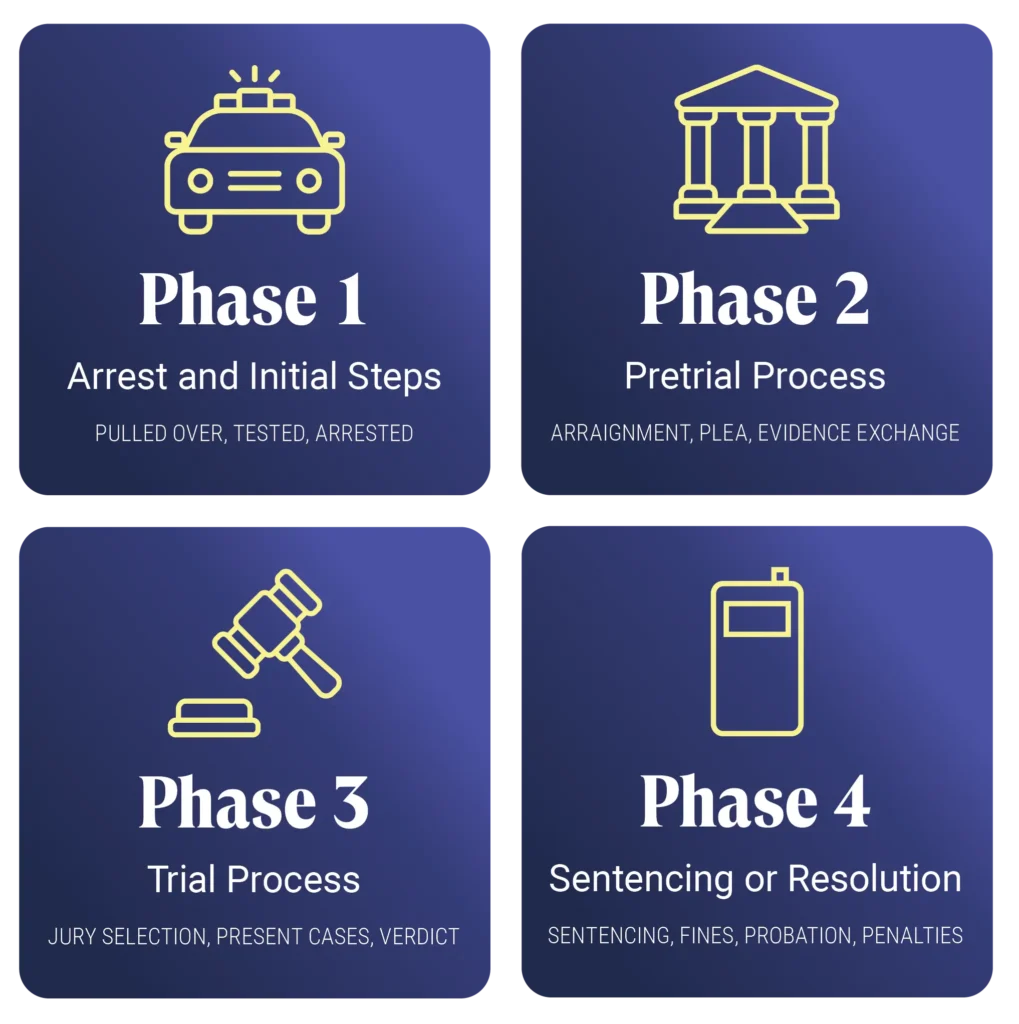
If you’ve recently received your first DUI, it’s normal to feel anxious and unsure of what lies ahead. The American court system can be intimidating, but understanding the DUI court process can help ease your anxiety. This guide explains each stage of the DUI criminal court process, so you’ll know what to expect as your case progresses.
While courts in every state operate a little differently, you can gain a high-level understanding of the DUI court process by separating it into these four phases. We’ll provide a little more detail for each below. This article does not constitute legal advice. You should always consult an experienced attorney in your jurisdiction with questions specific to your case.

Quick Links
- Phase 1: Arrest and Initial Steps
- Phase 2: Pretrial Process
- Phase 3: Trial Process
- Phase 4: Sentencing or Resolution
Phase 1. Arrest and Initial DUI Court Steps
Once pulled over for a suspected DUI, a series of steps begins that can feel overwhelming. Understanding each phase can help prepare you for what’s next.
1. Traffic Stop and Investigation
The process starts when an officer pulls you over for erratic driving, a traffic violation, or at a sobriety checkpoint. The officer will observe your behavior for signs of intoxication including, but not limited to, slurred speech, bloodshot eyes, or the smell of alcohol.
2. Field Sobriety and Breathalyzer Tests
If the officer suspects you’ve been drinking, they will ask you to perform field sobriety tests (FSTs) to assess coordination and balance. These tests may include walking in a straight line, standing on one leg, or following an object with your eyes. You also may be asked to take a breathalyzer test to measure your Breathe Alcohol Concentration (BrAC).
- Field Sobriety Tests: Assess physical impairment.
- Preliminary Breath Test (PBT): A handheld breathalyzer test used at the scene to check your BrAC level.
3. DUI Arrest
If you fail the field sobriety or breathalyzer test, the officer will likely arrest you for suspicion of DUI. You will be handcuffed, read your Miranda rights, and transported to the police station or jail for booking and processing.
4. Booking and Chemical Testing
At the station, you may be booked—this involves taking your fingerprints, mugshot, and recording personal information. You may also be required to take a chemical test (breath, blood, or urine) to get an official BAC (Blood Alcohol Concentration) reading.
- Chemical Tests: Used to confirm your BAC or BrAC level and are critical in court as evidence.
5. Release on Bail or Custody
After booking, you will either:
- Be Released on Bail: You or a bail bondsman can post the required bail amount to secure your release until your court date.
- Remain in Custody: If you are unable to post bail or your case is particularly severe, you may remain in custody until your court appearance.
6. Receiving Your Court Date
Once released, you’ll probably be provided with a citation that includes the date and time of your first court appearance, known as an arraignment. This marks the beginning of the formal DUI court process. It’s essential to attend this hearing to avoid further legal issues, such as a bench warrant for your arrest.
Phase 2. DUI Court Pretrial Process
The pretrial phase is a critical part of the DUI court process, as it determines how the case will move forward.
1. Arraignment
The arraignment is your first formal court appearance. The judge will read the charges against you, and you’ll be asked to enter a plea: guilty, not guilty, or no contest. If you plead guilty or no contest, the case moves directly to sentencing. A not guilty plea advances the case to the pretrial phase.
2. Pretrial Conferences
A pretrial conference is a meeting between your lawyer and the prosecutor to discuss the case. The goal is typically to negotiate a plea deal, which could result in reduced charges or penalties if you agree to plead guilty.
3. Motions Hearings
If a plea deal isn’t reached, the case may proceed to one or more motions hearings. Your lawyer may file motions to suppress evidence, such as test results, if there were any legal or procedural errors during your arrest. These hearings help set the ground rules for an eventual trial.
4. Discovery Process
During discovery, both the prosecution and the defense exchange evidence. This may include police reports, chemical test results, and witness statements. Discovery allows your lawyer to build your defense and identify any weaknesses in the prosecution’s case.

Phase 3. DUI Court Trial Process
If the pretrial process doesn’t resolve the case, it will move to trial. The DUI trial process includes several steps designed to determine whether you are guilty or not guilty.
1. Jury Selection
If your case goes to a jury trial, the first step is likely jury selection. Your attorney and the prosecutor will choose jurors who they believe can be impartial. If you have a bench trial, the judge alone will hear and decide your case.
2. Opening Statements
Both the prosecution and the defense will make opening statements to provide an overview of their cases. The prosecution will argue that you are guilty, while the defense will present arguments as to why you should be found not guilty.
3. Prosecution Presents Evidence
The prosecution will present evidence intended to prove your guilt, which could include:
- Testimony from the arresting officer
- Results from field sobriety and chemical tests
- Witnesses or video footage (if available)
Your lawyer will have the chance to cross-examine the prosecution’s witnesses.
4. Defense Presents Evidence
Next, your lawyer will present your defense. This could involve challenging the validity of the arrest, questioning the accuracy of the tests, or presenting witnesses on your behalf. If the prosecution’s evidence is weak, your lawyer may motion for dismissal at this stage. Whether you are called to testify is a decision you and your attorney will make while preparing for the trial.
5. Closing Arguments
After both sides have presented their cases, they will make closing arguments. This is the final opportunity for each side to summarize their case and convince the jury (or judge) to rule in their favor.
6. Jury Deliberation and Verdict
Once closing arguments are completed, the jury (or judge) will deliberate and return a verdict. If you’re found not guilty, the charges will be dropped. If you’re found guilty, the case proceeds to sentencing.
Phase 4. DUI Court Case Sentencing or Resolution
If you are found not guilty, your case will likely be dismissed and you will not have the DUI conviction on your record.
If you plead guilty or are found guilty at trial, the final stage of the DUI court process is sentencing.
1. Fines and Penalties
The judge will impose fines and penalties based on the severity of your offense, your BAC level, and any prior DUI convictions. Additional penalties may include community service and license suspension.
2. Probation
You may be placed on probation, which requires you to comply with specific conditions, such as regular meetings with a probation officer, avoiding any further legal trouble, and completing an alcohol education program.
3. Ignition Interlock Device (IID) Installation
In some cases, the court may require you to install an ignition interlock device (IID) in your vehicle. This device prevents your car from starting unless you pass a breathalyzer test, ensuring you’re not driving under the influence.
4. Alcohol Education Programs or MADD VIP
Depending on your case, you may also be required to attend alcohol education programs or Mothers Against Drunk Driving Victim Impact Panel (MADD VIP). Some courts will also require you to find a sponsor to help you during the recovery process.
5. SR-22 or FR-44 Proof of Financial Responsibility
Many states require drivers convicted of DUI to have their insurance provider file an SR-22 certificate proving at least the state’s minimal active insurance coverage, which may alert your insurer to your recent driving charge.
Get Help Getting Past Your DUI
Navigating DUI requirements can feel overwhelming, but you don’t have to handle it alone. For guidance on completing your DUI requirements, including IID installation and SR-22 insurance, call DUI.org at (877) 246-7808. We’re here to support you with the resources and information you need to get back on the road responsibly.
Frequently Asked Questions About the DUI Court Process
Will I Need to Go to Court if I Get a DUI?
Yes, you will need to attend court for each step of the DUI court process, starting with your arraignment. Failing to attend could result in additional penalties, including a bench warrant for your arrest.
Will I Need a Lawyer for a DUI?
While not required, it’s highly recommended to hire a lawyer. An attorney is the best person to advocate on your behalf, answer your questions, and understand the specifics of your case and the law and practices of the jurisdiction. They can help reduce your penalties, negotiate a plea deal, or even get your case dismissed.
What Happens During My First DUI Court Appearance?
Your first appearance is your arraignment, where you’ll enter a plea. This is a relatively short but important hearing that sets the direction of your case.
Is My DUI a Misdemeanor or a Felony?
Most first-time DUIs are misdemeanors, but a DUI can be elevated to a felony if there are aggravating factors, such as causing injury or having multiple prior offenses.
What Is Sentencing for a DUI?
Sentencing varies depending on the case, but typically includes fines, probation, and possibly the installation of an IID. You may also be required to attend alcohol education classes or AA meetings.
Will My DUI Be on My Record?
Yes, a DUI conviction will remain on your criminal record, which can impact your future job prospects, housing options, and insurance rates. Some states allow expungement after a certain period.
How Can I Move Past Getting a DUI?
While a DUI can feel overwhelming, completing court-mandated requirements, attending rehabilitation programs, and complying with IID installation will help you move past the DUI court process and regain control of your life. DUI.org can help.
Get support.
What is next? We can help you through the process. Give us a little information and we can support you through the next steps.
All fields are required.